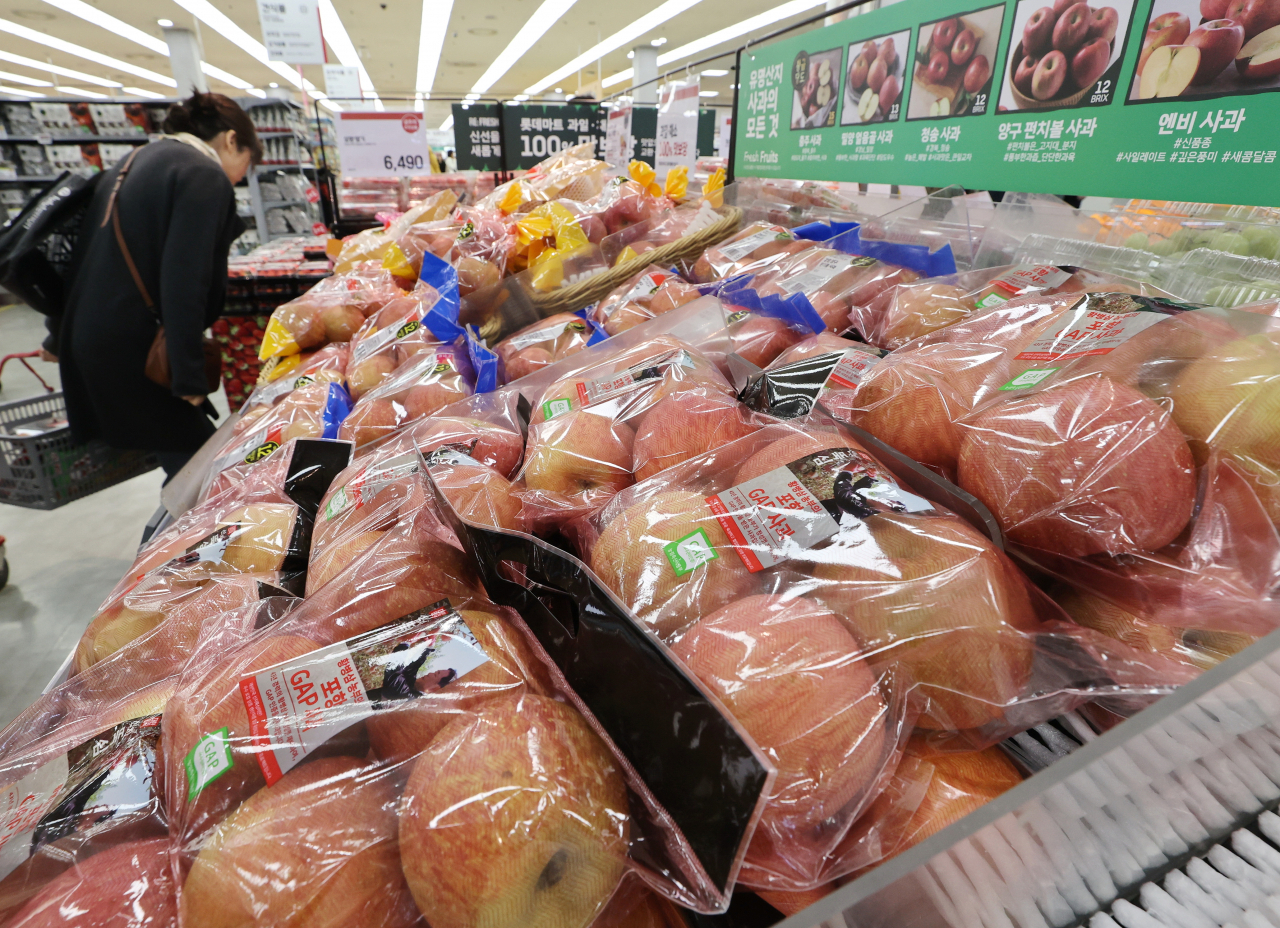 |
People shop at a major discount chain store in Seoul on March 21, 2024. (Yonhap) |
South Korea's inflation stayed over 3 percent for the second consecutive month in March on record prices of fruits and rising global oil prices, data showed Tuesday.
Consumer prices, a key gauge of inflation, rose 3.1 percent on-year last month, following a 3.2 percent increase the previous month, according to the data from Statistics Korea.
In January, inflation fell below 3 percent for the first time since July 2023, but high prices of fruits, farm produce and energy have caused inflationary pressure to flare up again.
Prices of agricultural, livestock and fishery products rose 11.7 percent on-year last month, the highest rise since April 2021, when the prices rose 13.2 percent.
Agricultural products, in particular, spiked 20.5 percent, which accounted for a 0.79 percentage point increase in the overall inflation.
Of major items, prices of apples surged 88.2 percent, a record surge since the agency began compiling relevant data in 1980.
Prices of pears spiked 87.8 percent, also an all-time high, and those of tangerines soared 68.4 percent. Prices of 18 major kinds of fruits combined turned up 40.3 percent last month.
"Poor harvests amid unfavorable weather conditions and a base effect have jacked up fruit prices," an agency official said, noting that the price level came despite the government's recent discount programs and aggressive campaigns.
Prices of industrial products added 2.2 percent, driven by rising prices of clothing.
Prices of petroleum products also rose 1.2 percent on-year amid instability in global oil prices, and it marked the first time since January 2023 that petroleum products reported an on-year price hike.
Dubai crude, South Korea's benchmark, rose to $84.18 per barrel on average in March, compared with $77.33 in December, $78.85 in January and $80.88 in February, according to government data.
Service prices increased 2.3 percent on-year in March.
In detail, insurance service fees advanced 17.9 percent and housing maintenance fees rose 4.8 percent on-year. Prices of dining out went up 3.4 percent.
Core inflation, which excludes volatile food and energy prices, went up 2.4 percent on-year in March.
Prices of daily necessities -- 144 items closely related to people's everyday lives, such as food, clothing and housing -- climbed 3.8 percent last month, the data showed.
"Geopolitical factors that affect oil prices and weather conditions are expected to be crucial factors regarding the country's inflation level down the road," the agency official said.
Finance Minister Choi Sang-mok said the price level seen in March is forecast to have been the highest for this year, and inflation is likely to be eased at a faster clip running through the end of 2024.
"The last mile (to the target inflation of 2 percent) has been bumpy for major nations, and South Korea is not an exception," Choi said.
"Though the government was able to rein in inflation thanks to cooperation by all economic players and policy efforts, the current price level is quite high for the people. We will make all-out efforts to achieve a 2 percent level of inflation at an early date," he added.
The finance ministry said the government will continue to implement farm produce discount programs and lower tariffs on a greater amount of imported fruits.
A task force will be up and running to be in charge of devising measures to improve the country's logistics structure for farm produce in an effort to "fundamentally" ensure their price stability. It is expected to announce reform measures this month.
The agriculture ministry announced a plan Tuesday to boost the volume of apples on contract farming by three times and that of pears by 1.5 times by 2023, and to create 2,000 hectares of apple cultivation areas in the eastern province of Gangwon.
The government will also designate 60 "smart orchards" with greater fruit productivity to extend support.
Apples are one of the most consumed fruits in South Korea. (Yonhap)







